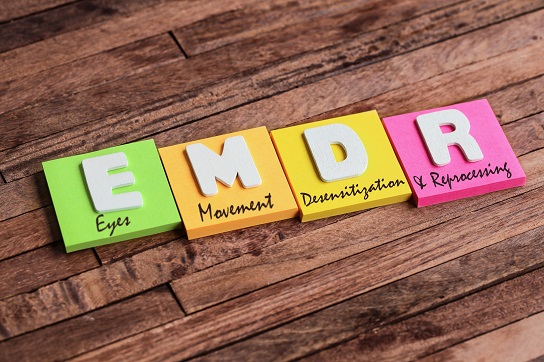EMDR Therapy
Are you looking for something to help you get to the root of your pain but don’t know how?
Have you been in therapy and feel like it’s just not giving you the results you’re looking for? If so, Eye Movement Desensitization and Reprocessing (EMDR Therapy) is an excellent option to consider for your mental health. But what is it? It’s become more and more popular these days, and you may have even seen it being used in a show or movie.
You’ve come to the right place to learn more about how it may be a good therapy option for you.
EMDR therapy is an integrative therapy approach that helps people heal from traumatic events and other emotional challenges, such as grief/loss, child abuse, domestic violence, abandonment, post-traumatic stress disorder (PTSD), and other complicated and difficult life issues.
Believe it or not, so many people seeking help don’t realize that they have had a traumatic experience. Most people only think of obvious events as being traumatic, such as a life-threatening accident or a sickness, or other disturbing memories or events such as long-term abuse.
It is so important to understand that, in fact, many of the experiences that we’ve all had at some point in life can be considered traumatic, such as bullying, a car accident, or toxic or failed relationships.
These hidden traumas can lead to trauma symptoms that seem to not make sense when you’re experiencing them, and these symptoms can leave us confused and lost. And sadly, these symptoms can affect the function of your everyday life including work, school, or relationships.
Relevant Blog Posts

3 Types of Therapy Services to Improve Mental Wellness
Some people may be hesitant to seek therapy services, but sometimes, it can be the best thing for somebody. In the United States, about 19.2% of adults had some type of mental health treatment in the past 12 months. This should signal that you are alone and if you...

Benefits of EMDR Therapy: What to Know
Last year over 40 million Americans received mental health services. But not all mental health services are the same and different types of therapy work for different people. Eye movement desensitization and reprocessing (EMDR) therapy is a relatively new...

What Is EMDR Therapy? 5 Impressive Benefits
Whether you are suffering from a mental health condition, are a mental health professional, or are simply interested in keeping up with mental health and psychotherapy trends, chances are that you've heard of EMDR therapy. But what is EMDR therapy, exactly? Read on as...
What can EMDR therapy help with? Can it really work for me?
This is a question we get quite often. EMDR therapy is proven to treat so many issues, and some are listed below.
- PTSD
- Abuse (physical, sexual, emotional)
- Phobias
- Anxiety
- Depression
- Grief
- Performance Anxiety
- Vicarious trauma
If you don’t see your issue on the list, that’s okay! We encourage you to reach out to us and set up a free phone consultation to discuss what you’re hoping for. You’ll have an in depth conversation about what your goals are, and we will help you figure out if EMDR is right for you!
What if I’m already in talk therapy? Can I still do EMDR Therapy?
Yes! Our EMDR therapists will provide what is called adjunct EMDR therapy. That means while you are seeing your talk therapist, we can still provide EMDR therapy in conjunction with your current treatment.
Adjunct EMDR therapy is often requested when you’re feeling like you may have “hit a wall” so to speak with your talk therapist. It may feel like you’re not quite going as deeply into the issues as you would like, and you’re feeling a block. Another possibility is your current therapist is not trained in resurfacing trauma memories, so it makes sense for you to seek out additional support.
In these scenarios, short-term EMDR therapy can help you unblock those limiting beliefs, lingering memories or sensations. You can finally feel as though you are on the road to resolving those issues that have been holding you back in life and it may deepen the work you’re already doing with your primary therapist.
An important piece of adjunctive EMDR therapy to note is your EMDR therapist will not replace your primary therapist. Instead, they will be additional support to your mental health care team.Treatment may be shorter in adjunctive EMDR, and your EMDR therapist will collaborate with you and your talk therapist to discuss what is in your best interest.
So what can you expect in your sessions with your EMDR therapist?
There are a series of steps your EMDR therapist will go through to ensure you are receiving the highest quality care. We understand how scary and anxiety provoking it might feel coming to therapy knowing you will be addressing some of the most painful feelings and memories, so we ensure that a quality therapeutic relationship has been developed. We want to be certain that you feel as comfortable and emotionally safe as possible. When you’re ready, we’ll begin with…
- Phase one: a discussion between you and your EMDR therapist about what brought you in, and how EMDR can best serve you and your present needs. You will be asked about your history so your therapist can understand what you’ve been through, and this will inform how your therapist develops a treatment plan.
- Phase two: your EMDR therapist will explain the process, set expectations, and answer any questions or concerns you have. All phases in EMDR are collaborative, and it’s vital that you and your therapist discuss what specific techniques you will use to cope with any painful emotional material that will come up. It’s important to take your time in this phase as it lays the groundwork for the transformational work you’re about to embark on.
- Phase three: here, you and your therapist will discuss what event(s) you want to process (also known as the target), along with the feelings, sensations, images, or beliefs that are connected to that event.
- Phase four: reprocessing begins! Desensitization of painful thoughts, sensations, images, and feelings begin using bilateral stimulation while focusing on the painful memory
- Phase five: When desensitization is complete, you will be asked to associate and strengthen positive beliefs with the memory you focused on until it feels completely true to you
- Phase six: You’ll be asked to think about the target event and the new positive belief while scanning your body to see if there any lingering and unresolved sensations in your body
- Phase seven: Before ending every therapy session, you and your therapist ensure that you are in a state of calm in the present moment, and will engage in various techniques to promote a state of ease if you are not there yet.
- Phase eight: You and your EMDR therapist talk about how the reprocessing is going to ensure progress is being made, and to assess what other future topics you want to bring into your treatment.
How long does EMDR therapy usually take?
Treatment length tends to vary depending on what topics you want to address, what is currently happening in your life, and the amount of past traumatic experiences you have had. At times, treatment can last a few sessions to resolve mild to moderate symptoms. In more severe cases, long term treatment may be recommended to resolve symptoms and process multiple or more severe traumas.
Is EMDR therapy effective online?
Yes! EMDR therapy online can be incredibly effective, and you get to reap the benefits of such an impactful type of therapy wherever you prefer. Fortunately, there is a growing body of research suggesting that EMDR therapy is still very effective when provided online. Additionally, online EMDR therapy also means we’re able to provide this service to any resident in the state of California.
At this time, we are only offering EMDR therapy online.
For EMDR therapy services, contact us by form or phone at 408-404-5983.
Interested in a free 15 minute consultation? Schedule here!


